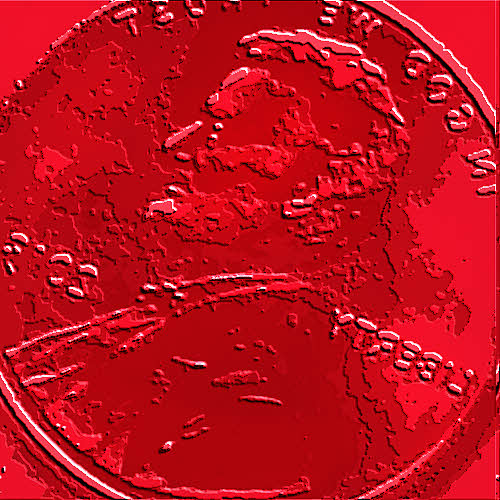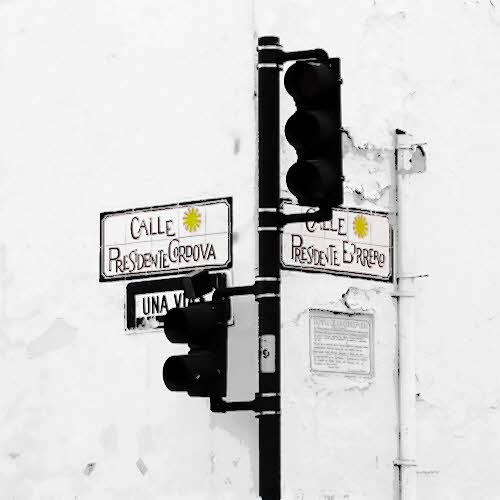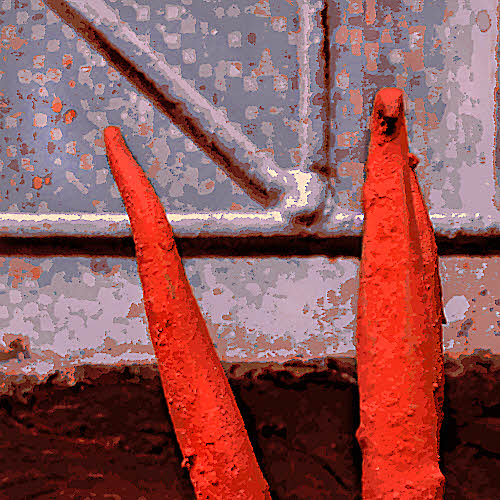Observing the Mobile Beaker Patrol.

This is a reasonably clean place, this Cuenca, Ecuador.
No, you try it.
What?
Eating off the pavement — I don't have that much to prove, especially to you.
When I say that Cuenca, Ecuador is a clean place, it is your job to then take that blanket statement and put it into perspective. Feel free to add as many grains of salt as you can find.
Suggestions follow.
Fleur de Sel? Fine. Sel Gris? OK by me. Flake Salt, then, how about that? Well, not to point any fingers, but if the flake fits, then shove it up your nose, Bub. Himalayan? Yep, from a place noted for its fine, clean beaches and abundance of cod. Shio? Surely. Curing Salt? If you be ailing you, and you got the prescription, then start shakin' it, mate.
Any other salt? Ditto, as if I really cared. Go do it or not. I'm only trying to make a point, so quit being literal or I'll come over there and whack you with a bag of pepper.
Now, back to our regularly-scheduled, one-way discourse. This is a reasonably clean place, this Cuenca, Ecuador. And "Why?" you may ask, including actual quotes to make you sound not only snooty, but worth taking seriously, in a dead old white man suit-wearing way.
Because. (My favoritest rebuttal, good for all occasions.)
Because there is a whole cadre of street sweepers here, in uniform, sweeping streets all day, every day, manually. Partly for that reason. And when I use the phrase all day, every day I do. Mean it. Including New Year's Day. At least New Year's Day of 2013, when I saw more than one of these public employees on the job, early, operating brooms with vigor.
Partly for that reason. And partly because many forms of "waste" in other parts of the world are properly regarded here as resources. Profit centers. Opportunities. What ends up on the street and does not get used is not useful. Dog poop, for example. Tiny scraps of paper. Things like that — things we, as of yet, as a species, have not found it useful to capture and carry home for resale or for folding into other products or into our foodstuffs.
And then there are those other substances — organic waste that is not dog poo or human poo (or, during the December through March holiday season, random surprise scatterings of horse poo).
Organic "waste" such as...? Spilled grain, or spilled food of any kind, like bread crumbs or pork bits. Anything. And this is where the auxiliary corps comes in — Cuenca's unpaid, volunteer sanitary engineers. Pigeons.
It required eight months of living here and a measure of imagination before I realized the truth. This place is swarming with pigeons, as are many cities. (That is not the truth part, yet. We will come to it shortly.) I have seen people feeding them (the pigeons), but when they (the pigeons) aren't being fed, they forage.
They forage. That is the key, the truth-part, right there. Did you see it go by? If not, then go back and read it now.
When foraging, pigeons peck at anything. Hell — everything. Everything, and especially anything too small for me to see. If it's there, it gets a peck, whether I can imagine a beakable peck target or not. Peck. Peck. Peck-peck-peck-peck-peck-peck-peck. All day. Everywhere.
That's the secret. Peckers, all over, going at it like crazy.
Pigeons. Pigeons and their insistent peckers.
They are always around, pecking at every damn thing, visible or not, and they probably clean up as much garbage as anyone or anything else. Because if they don't do this they'll have to go back to the countryside and try making a living there, or to New York City, or Dallas. Or Buenos Aires. Any of which might be seriously worse than country life with its constantly muddy feet and no movie theaters or sparkly lights anywhere.
No one wants to live in Buenos Aires or Dallas these days, if they can avoid it. Or the countryside where hard work is unavoidable, if you prefer a life of eating and pooping and not much else. Which is kind of the Way of the Pigeon, I guess.
So they're here. And they, too, do poo. On everything.
I'll let you know PDQ (which is slang for posthaste) if I find what eats pigeon poo. But I don't believe there is such an angel being, cuz that stuff there? That there stuff? That stuff (pigeon poo), no one cleans up. Not even the rain.
Paradise — love it or poop on it.
And so. This is me signing off again, and stepping around what I don't want to carry home on my shoes.




